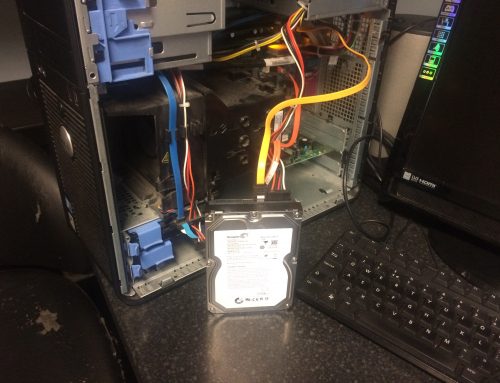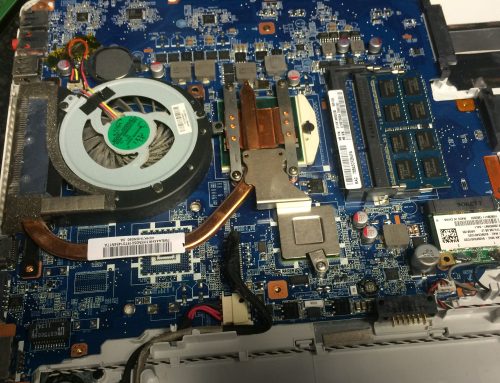PC Workshop are currently working on a lady’s PC Tower from Chapelford Warrington to check what damage has been caused by a telephone call from a “Microsoft Security Expert” who smooth talked her into allowing him access to her system so he could “check” her security etc. He then wanted to charge her £110 for the privilege!
She called the fraudsters bluff and told him that the conversation was being recorded and she was going to contact the police! He then started to delete all her documents and photos and any other data he could find in her documents folder, this went on before her eyes until she turned he computer off!!!!!

The lady phoned us heartbroken that she had lost years of memories and now she was also locked out of her computer as the fraudster had placed a key lock proggrame on her start up screen.
PC Workshop had the devil of a job to rescue all the deleted files but over a couple of days they were restored back to our safe storage system, the hard drive was then reformatted and installed with windows 7, plus a excellent security package. Her work was scanned and restored back to relevant folders, she was ecstatic to not have lost her photos and promised to spread the word about our data recovery skills. “A minor miracle” were her words.
This type of work is more time consuming than visually apparent, and lady was more than a little satisfied that her laptop and information was under her control and not in the hands of some distant fraudster.
PC Workshop has itself been the recipient of these calls on several occasions but the call has shall we say been “short lived” but it is really easy to fall for this official sounding thief!
If you receive a phone call from a security ‘expert’ offering to fix your PC – it’s a scam. Here’s how to avoid the ‘Microsoft phone scam’, and what to do if you fear you have fallen victim to it.
‘Microsoft phone scam’. This is something as a misnomer, as Microsoft has nothing to do with it.
This link below takes you to a U Tube video of what happened when a fraudster phoned Jerome Segura, a senior security researcher at anti-malware company Malwarebytes. –
http://www.wired.co.uk/news/archive/2013-04/11/malwarebytes
Microsoft phone scam: how it works
Scammers calls you, and asks for you by name. They say they are a computer security expert from Microsoft (or another legitimate tech company). The ‘security expert’ is plausible and polite, but officious. They say that your PC or laptop has been infected with malware, and that they can help you solve the problem. What happens now depends on the particular strain of scam with which you have been targeted.
Some crooks will ask you to give them remote access to your PC or laptop, and then use the access to harness your personal data. Others get you to download malware that will do that task for you. A more straightforward scam is to simply ask for money in return for a lifetime of ‘protection’ from the malware they pretend is on your machine.
Here’s the important part: no legitimate IT security pro is ever going to call you in this way. For one thing, they can’t tell that your PC is infected. They’ve got your name from the phone book, or any one of the thousands of marketing lists on which your details probably reside. They know nothing about your home computing set up.
Basically, somebody is sitting in a room calling number after number hoping to find a victim. It’s not personal, but it is ultimately dangerous to your financial and technological health.
Microsoft phone scam: what to do if you are called
1. Number one: put the phone down. Get rid of the caller and move on with your life. It is not a legitimate call.
2. During your conversation, don’t provide any personal information. This is a good rule for any unsolicited call. And certainly never hand over your credit card or bank details. Just don’t do it.
3. If you’ve got this far, we can only reiterate point number 1: get off the phone. But whatever you do don’t allow a stranger to guide you to a certain webpage, or instruct you to change a setting on your PC or download software.
4. If possible get the caller’s details. You should certainly report any instance of this scam to the police.
5. Finally, change any passwords and usernames that could plausibly have been compromised, and run a scan with up-to-date security software. Then ensure that your firewall and antivirus are up to date and protecting your PC.
Microsoft phone scam: What to do if you have been a victim
First of all don’t beat yourself up. This could happen to anyone (and does). First of all, you need to change all the personal data that you can change. As much as you might like to you can’t change your date of birth, and changing your name and address seems extreme.
But you can change all your passwords and usernames, starting with your main email account and any bank and credit card logins. Also, contact your bank to ask them to be on the look out for anything dodgy.
Again, use up-to-date security software to scan and cleanse your PC, and if the scammer did get you to do something to your PC using System Restore to roll back the settings is always a good idea. And tell the police. If you have lost money, it’s possible your credit card company or contents insurance will cover the loss.
If you do encounter this fraudster and would like PC Workshop to check your computer or laptop please ring us on 01925 713359


